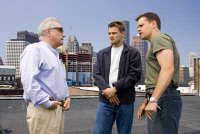
Written and Directed by Ryan Murphy
In 2002, author Augusten Burroughs published his memoir, entitled RUNNING WITH SCISSORS. It went on to find success and praise, as well as skepticism regarding its authenticity. The book chronicles Augusten’s formative years where he was sent to live with his mother’s psychiatrist and his family (the Finches) while she dealt with her manic depression. The book has a dry humour that refuses pity for Augusten’s numerous woes. Reading it brings about many laughs but at no point in time does it come across as a factual retelling of events. One almost needs to distrust the author to find his humour. To ponder Augusten’s perils as if they were plausible would plunge any heart into deep pain. So we laugh instead. That is after all what Augusten’s style incites. What is lacking in the book finds even less presence in the film. Purpose. You can tell your own story and you can embellish it all you like but if your journey doesn’t lend any meaning to my own then it becomes more useful in serving your own ego than enriching mine. Writer/Director Ryan Murphy’s translation segments Augusten’s book into a visual compilation of his favorite literary moments that lead nowhere and reveal very little about the man behind the memoir.
Bearing Burroughs’ weight is actor Joseph Cross. Cross plays Burroughs with a near-permanent face of silent awe throughout. He cannot comprehend how his life took such a bizarre turn. His youthful grin hints to his strong character while his conscientious eyes confirm his understanding that the path he has been forced upon will not lead to a fulfilling life. Augusten must bounce back and forth between his mother’s (Annette Bening) home and the Finch’s, where he is further bounced around from one psychological mess to another. Whether Augusten is sitting in the Finch parlor with feeble, subservient mother, Agnes (Jill Clayburgh) while she nibbles at dog kibble or passively accepting older daughter Hope’s (Gwyneth Paltrow) abuse towards her cat or hovering over a toilet bowl to observe the sign from God that has come in the form of Dr. Finch’s (Brian Cox) stool, he always looks lost. Going home doesn’t help either as what waits for him there is often just as outlandish but more so scarring as his mother’s psychoses could one day kill her or one day be his. As lost as he gets, at times joining in the mentally unstable fun, he never lets go entirely of the railing that has helped him maintain his balance all the while. Respectful but problematic as someone in his position needs to become mostly unrecognizable in order to find himself again, Augusten’s lines of sanity are much more blurred in print then on screen as Murphy does not construct any build in character, shuffling Cross around repeatedly as though his life took place in a pinball machine.

RUNNING WITH SCISSORS is both a dream and a nightmare for actors. It all depends on who you are and whom you’re playing. Bening and Cross get the most screen time by far. The rest of the cast drift in and out of the narrative, giving each of them very little time to make their mark. It also doesn’t help matters that everyone is playing a character with some degree of mental defect. As a result, Paltrow and Joseph Fiennes (as Augusten’s thirty something year old lover, Bookman) overact their characters into caricature. More veteraned actors like Clayburgh and Alec Baldwin (as Augustan’s father) have very little screen time but manage to subtly give humanity to their madness, making some of the most evident impacts on Augusten. Of course, Augusten is overshadowed by Bening as Deirdre. His mother needed to be the focus whenever she was in the room so it is only fitting that Augusten struggle for attention in a movie about himself. Thankfully, Bening delivers a performance that is as layered as her character is medicated, justifying the spotlight and delighting her audiences yet again.
The chemistry between the ensemble and a sundry soundtrack make RUNNING WITH SCISSORS reasonably enjoyable but it does not bring you anywhere near Augusten’s heart. A new hair style and a fashionable scarf are not character development. RUNNING WITH SCISSORS may amuse in its audacity but despite surrounding Augusten with psychologically damaging absurdities every step of the way, it fails to show any real insight into what made Augusten the man he became.













